- Home
- David Sedaris
Let's Explore Diabetes With Owls Page 2
Let's Explore Diabetes With Owls Read online
Page 2
Lisa speculated that it was Tommy Reimer, not because she got a clear look at him but because it happened near his house.
“Tommy Reimer, huh?” My father looked across the table to my mother. “Isn’t that one of Arthur’s boys?”
“Oh, Lou, let it go,” my mother said.
“What do you mean, let it go? A kid who uses language like that has got a problem, and I’m going to see that it gets fixed.”
“Maybe I misunderstood him,” my mother said. “Or maybe he thought I was someone else. That’s it, most likely.”
“I’ll be sure to clear that up when I talk to him,” my father said, his cue that the subject was closed and that now we would move on to something else. When her children were grown and gone from the house, my mother would eat late, often by herself in front of the TV, hours after she had served our father, but back then, like most every other family on our street, we had dinner at six. On this particular night the sun was still out. It was early September, and though I don’t remember what we were eating, I can clearly recall cringing at the sound of the doorbell.
Oh God, I thought, as did everyone else at the table. For when it was dinnertime and someone came calling, it was always our father who insisted on answering the door and on telling whoever it was, very firmly, that it was not a good idea to interrupt people while they were eating. It could be a woman from down the street or maybe one of our friends. It might be a Girl Scout selling cookies or a strange man with a petition, but when that door was flung open, everyone on the other side of it wore the same expression, a startled, quizzical look that translated, in that gentler, more polite time, to “Where are your pants, sir?”
Lisa had left school early that day. A classmate was supposed to drop off a homework assignment, and worried that it might be her, she jumped up and ran into the other room, calling, “That’s okay, I’ve got it.”
My father raised himself and then sat back down. “You tell whoever it is that we’re eating our supper, damn it.” He scowled at my mother. “Who the hell drops by at this hour?”
We all strained to hear who our visitor was, and when Lisa said, “Oh, hi, Tommy,” our father leapt up and ran to the door. By the time we got there, the boy, who was one grade behind me, was pinned against the redwood siding of our carport. My father had him by the neck, raised off the ground, and his little legs were flailing.
“Dad,” we called. “Dad, stop. That’s the wrong boy. You’re looking for Tommy Reimer, but this is Tommy Williams!”
“It’s who?” In his work shirt and underpants, he looked powerful but also cartoonish, like a bear dressed up for a job interview.
“Lou, for God’s sake, put that boy down,” our mother said.
My father lowered Tommy to the ground, where he doubled over and gasped for breath. He was a chubby kid, and his face, which was freckled and normally pale, was now the color of a valentine.
“Hey, son,” my father said, so sweet suddenly, so transparent. He put his hand on Tommy’s shoulder. “You all right? Want some ice cream? How about some ice cream?”
“That’s okay,” Tommy croaked. “I think I’ll just go home.”
“Actually, no,” my father said, and he guided the boy through our open door. “We’d like you to stay for a while. Come on inside and join us.” He turned to me and lowered his voice. “Find some ice cream, damn it.”
If there’d been anything decent in the house, anything approaching real ice cream, it would have been eaten long ago. I knew this, so I bypassed the freezer in the kitchen and the secondary freezer in the toolshed and went to the neglected, tundralike one in the basement. Behind the chickens bought years earlier on sale, and the roasts encased like chestnuts in blood-tinted frost, I found a tub of ice milk, vanilla-flavored, and the color of pus. It had been frozen for so long that even I, a child, was made to feel old by the price tag. “Thirty-five cents! You can’t get naught for that nowadays.”
That this was my thought while my friend sat, red-throated as a bullfinch, at our dining room table speaks volumes about that era. Even if Tommy had escaped captivity and run back home, it’s not likely his parents would have called the police, much less sued and sent us to the poorhouse. No angry words would be exchanged the next time his father passed mine in the street, and why would there be? Their son hadn’t died, just gone without oxygen for a minute. And might that not make him stronger?
On opening the ice milk I saw that it had thawed before its last freezing. Beneath an inch of what looked like snow, the texture was wrong, too slick-looking and so hard it bent the spoon and came out in slender, translucent chips. It took everything I had to chisel out a bowlful of them, but in time I did. Then I carried it in to Tommy and set it before him on the table. It was strange, him faced with dessert while the rest of us were still working on dinner. For a minute he just sat there, staring down and blinking. My father chose to interpret this as an expression of wonder. “That’s right,” he said. “It’s all for you. I’m sure we can even find some more if you want it.”
Tommy looked at us, seven sets of eyes, watching, and he reached for his spoon.
“There you go,” my father said. “Attaboy. Eat up.”
Think Differenter
Of the many expressions we Americans tend to overuse, I think the most irritating is “Blind people are human too.” They are, I guess, but saying so makes you sound preachy and involved, like all your best friends are blind—which they’re probably not. I, personally, don’t know any blind people, though the guy I used to buy my newspapers from had pretty bad cataracts. His left eye had a patch over it, and the right one reminded me of the sky in a werewolf movie, this pale blue moon obscured by drifting clouds. Still, though, he could see well enough to spot a Canadian quarter. “Oh no you don’t,” he said to me the last time I bought something. Then he actually grabbed my hand!
I pulled it back. “Well, excuusssse me.” Then I said, “I think it’s a-boat time I take my business elsewhere.” Normally I say “about,” but I wanted him to think I was Canadian, which could have been true if I was born a couple hundred miles to the north. The son of a bitch half-blind person. I’m through defending the likes of him.
Number two on my irritating expression list is “I’ll never forget the time…” People say this to me, and I think, Yawn. Am I ever in for a boring story. Take this Fourth of July party, the one thrown every year at the apartment complex I live at. I went last summer, and it was me, this guy Teddy from two doors down, and a woman from the ground floor all standing around the pool. The fireworks had ended, and all of a sudden, out of nowhere, Teddy looks down into the water. “I’ll never forget the time my five-year-old daughter drowned,” he told us, all mournful, as if it happened that week and not an entire year ago.
The woman from the ground floor put her hand on his shoulder. “Oh my God,” she said. “That is the saddest thing I ever heard in my life.”
I, meanwhile, was standing there thinking that you should never say never, especially in regard to what you’ll remember. People get older, and you’d be surprised by what they forget. Like, for example, a few weeks back I called my mother to wish her a happy birthday, her eightieth. “I bet you wish that Dad was still alive,” I said. “That way the two of you could celebrate together.”
“But he is still alive,” she told me.
“He is?”
“Well, of course,” she said. “Who do you think answered the phone?”
Here I am, just turned fifty, and I forgot that my father isn’t dead yet! In my defense, though, he’s pretty close to it. Healthy enough for the moment, but he doesn’t do any of the stuff he used to do, like give me money or teach me to ride bikes.
There are things you forget naturally—computer passwords, your father’s continuing relationship with life—and then there are things you can’t forget but wish you could. Once, for instance, when I was in the third grade, I saw our dog Pepper chew the head off a baby rabbit. I mean right off too, the way
I’d pop the lid from an aspirin bottle. That, I can recall just like it was yesterday, while my first child being born—total blank. I know I was in the delivery room. I even remember what I was listening to on my Walkman, but as for the actual kid coming out—nothing. I can’t even tell you if it was a boy or a girl, but that’s natural for a first marriage.
The Walkman, though, I’ll never forget its weight and the way it fit into my jacket pocket. Now, of course, it would be like carrying around a brick, but at the time it was hard to imagine anything more modern. When the first iPod came out, I recall thinking that it would never last. Isn’t that funny? It’s what old kooks thought when the car was invented, only now the kook was me! I held on to my Walkman until the iPod shuffle was introduced, at which point I caved in and bought one.
I got remarried as well, but it only lasted until the iPod nano, which the child from that marriage—a boy, I’m pretty sure—threw into the toilet along with my wallet and my car keys. Instead of fishing it all out and getting my hands dirty, I left that wife and kid and moved to where I live now, the apartment complex I mentioned earlier. I thought of replacing my nano, but instead I waited awhile and got an iPhone, which I specifically use not to call either of my ex-wives or the children they tricked me into having. It’s a strain on the eyes, but I also read the paper on it, so take that, newsagent—I’m the half-blind one now, and you’re out of a job!
The iPhone 2 led to the 3, but I didn’t get the 4 or 5 because I’m holding out for the 7, which, I’ve heard on good authority, can also be used as a Taser. This will mean I’ll have just one less thing to carry around. And isn’t that technology’s job? To lighten our burden? To broaden our horizons? To make it possible to talk to your attorney and listen to a Styx album and check the obituaries in the town where your parents continue to live and videotape a race riot and send a text message and stun someone into submission all at the same time?
Doing it all while driving is illegal where I live, so I’m moving to a place where freedom still means something. I’m not telling you where it is, because I want it to remain unspoiled. I’ll just say it’s one of the few states left where the mentally ill can legally own firearms. They used to be limited to muskets, but now they can carry or conceal everything a normal person can. If you don’t think a mental patient has the right to bring a sawed-off shotgun to the church where his ex-girlfriend is getting married, you’re part of the problem. The truth is that crazy people—who are really just regular people but more misunderstood—have as much of a right to protect themselves as we do.
Live with liberty, and your imagination can soar. If I had been born in the state I’m moving to, there’s no telling who I might be by now—an oral surgeon, maybe, or perhaps the ruler of the whole U.S. countryside. Other kings would pay me tribute with livestock and precious gems, but deep inside I don’t think I’d be any different from who I am today: just a guy with a phone, waiting for the day when he can buy an even better one.
Memory Laps
I always told myself that when I hit fifty I was going to discover opera, not just casually but full force: studying the composers, learning Italian, maybe even buying a cape. It seemed like something an older person could really sink his teeth into—that’s why I put it off for so long. Then I turned fifty, and, instead of opera, I discovered swimming. Or, rather, I rediscovered swimming. I’ve known how to do it since I was ten and took lessons at the Raleigh Country Club. There was a better place, the Carolina Country Club, but I don’t believe they admitted Yankees. Jews either, if my memory serves me correctly. The only blacks I recall were employees, and they were known to everyone, even children, by their first names. The man behind the bar was Ike. You were eleven-year-old Mr. Sedaris.
The better country club operated on the principle that Raleigh mattered, that its old families were fine ones, and that they needed a place where they could enjoy one another’s company without being pawed at. Had we not found this laughable, our country club might have felt desperate. Instead, its attitude was Look at how much money you saved by not being good enough!
I can’t speak for the two clubs’ golf courses, but their pools were the same size, and on a hot, windless afternoon you could probably smell them from an equal distance. Chlorine pits is what they were. Chemical baths. In the deep end, my sisters and I would dive for nickels. Toss one in, and by the time we reached it, half of Jefferson’s face would be eaten away. Come lunchtime, we’d line up at the snack bar, our hair the texture of cotton candy, our small, burning eyes like little cranberries.
My lessons were taken in June 1966, the first year of our membership. By the following summer, I was on the swim team. This sounds like an accomplishment, but I believe that in 1967 anyone could be on the Raleigh Country Club team. All you had to do was show up and wear an orange Speedo.
Before my first practice, I put swimming in the same category as walking and riding a bike: things one did to get from place to place. I never thought of how well I was doing them. It was only in competing that an activity became fraught and self-conscious. More accurately, it was only in competing with boys. I was fine against girls, especially if they were younger than me. Younger than me and physically challenged was even better. Give me a female opponent with a first-grade education and a leg brace, and I would churn that water like a speedboat. When it came to winning, I never split hairs.
Most of my ribbons were for good sportsmanship, a backhanded compliment if ever there was one. As the starting gun was raised, I would look at my competitors twitching at their places. Parents would shout their boozy encouragement from the sidelines, and it would occur to me that one of us would have to lose, that I could do that for these people. For whether I placed or came in last, all I ultimately felt was relief. The race was over, and now I could go home. Then the next meet would be announced, and it would start again: the sleepless nights, the stomachaches, a crippling and all-encompassing sense of doom. My sisters Lisa and Gretchen were on the team as well, but I don’t think it bothered them as much. For me, every meet day was the same. “Mom”—this said with a groan, like someone calling out from beneath a boulder—“I don’t feel too good. Maybe we should—”
“Oh no, you don’t.”
If I had been trying to get out of school, she’d have at least allowed me to plead my case, but then she had no presence at school. At the club she was front and center, laughing it up with Ike at the bar and with the girls in the restaurant beside the putting green. Once summer got going, we’d spend all day at the pool, us swimming and her broasting on one of the deck chairs. Every so often, she’d go into the water to cool off, but she didn’t know how to swim and didn’t trust us not to drag her under. So she’d sit waist-deep in the kiddie pool, dropping her cigarette ash onto the wet pavement and dissolving it with her finger.
There was a good-size group of women like her, and they were united in their desire to be left alone. Run to your mother with a complaint, and before she could speak one of the others would say, “Oh, come on now. Let’s not be a tattletale,” or, “You would have lost that tooth anyway. Now get back into the water.” I think of them in that terrible heat, no umbrellas, just sunglasses and bottles of tanning oil that left them smelling like coconuts.
The pool was a land of women and children until swim meets, which usually started at six. Then drinks would be ordered and the dads would arrive. For most of the fathers, this was just one more thing they had to turn up for. Their son was likely on his school’s football or basketball team. Maybe he played baseball as well. For my dad, though, this was it, and the way I saw it he should have been grateful. Look at all the time my fear of sports was affording him—weekends and evenings free.
In retrospect, I was never an awful swimmer, just average. I’d come in third sometimes, and once or twice, if I was part of a relay team, we’d place first, though I could hardly take credit. Occasionally, we’d have intraclub races, us against us, and in those, as in the larger meets, the star was a b
oy named Greg Sakas, who was my size but a few years younger, with pale yellow hair and legs no thicker than jumper cables. “God, that Greg Sakas, did you see him go?” my father said on the way home from my first meet. “Man alive, that kid is faaaantastic.”
In the beginning, it didn’t bother me. Greg wasn’t stuck-up. His father was decent enough, and everyone adored his mother. She was one of the few moms who could get away with wearing a bikini, a chocolate-colored one that, as the summer advanced, made it look as if she were naked. “That son of yours is really something,” I heard my father say to her after the second meet. “You ought to bring a movie camera out here and film him.”
On the way home, he repeated the conversation to my mother. “I said to her, ‘Send the footage to a professional swimming coach, and he’ll be champing at the bit! Your boy is the real thing. Olympic material, I’m telling you. He’s got speed, personality, the whole package.’”
Okay, I thought. You can shut up about Greg Sakas now.
We had a station wagon at the time, and my sister Gretchen and I were in what we called the “way back”—the spot where groceries usually went. When she was a baby, a dog bit her face and left her with a scar that was almost invisible until she got a tan. Then it looked like someone had chalked the number 1 four times on her cheek and put a strike mark through them.
“It’s the kids swimming against him I feel sorry for,” my father continued. “Those clowns didn’t stand a chance. And did you hear what he said when they handed him his blue ribbon? Who the hell knew Greg Sakas could be so funny? Good-looking too. Just an all-around four-star individual.”
When she was young, my sister was what we called chunky, and the longer my dad carried on about Greg the better it seemed to draw attention to it. “Hey,” I called. “Gretchen’s in a sunbeam. Does anybody else smell bacon frying?”

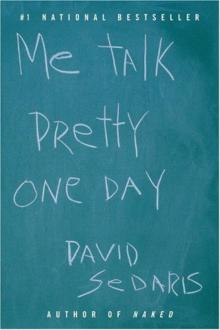 Me Talk Pretty One Day
Me Talk Pretty One Day Calypso
Calypso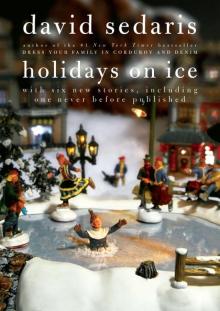 Holidays on Ice
Holidays on Ice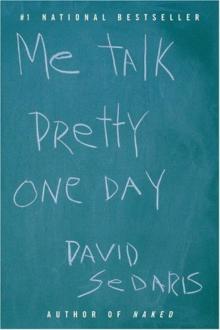 Mi vida en rose
Mi vida en rose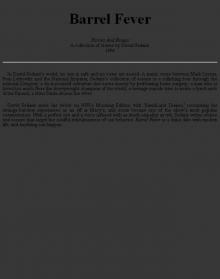 1994 - Barrel Fever
1994 - Barrel Fever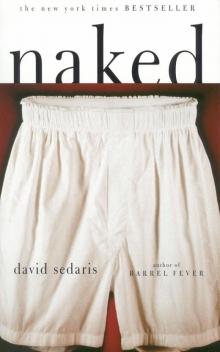 Naked
Naked Dress Your Family in Corduroy and Denim
Dress Your Family in Corduroy and Denim When You Are Engulfed in Flames
When You Are Engulfed in Flames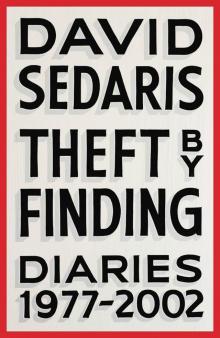 Theft by Finding: Diaries 1977-2002
Theft by Finding: Diaries 1977-2002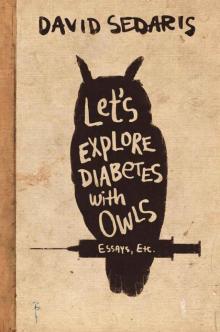 Let's Explore Diabetes With Owls
Let's Explore Diabetes With Owls Squirrel Seeks Chipmunk: A Modest Bestiary
Squirrel Seeks Chipmunk: A Modest Bestiary Children Playing Before a Statue of Hercules
Children Playing Before a Statue of Hercules The Best of Me
The Best of Me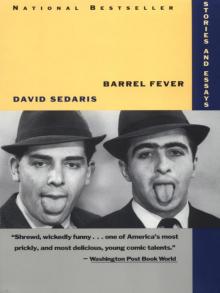 Barrel Fever
Barrel Fever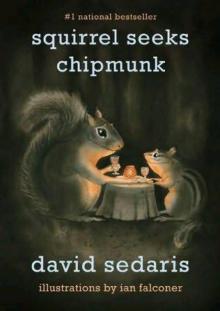 Squirrel Seeks Chipmunk
Squirrel Seeks Chipmunk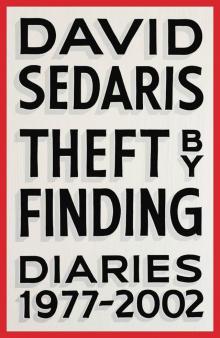 Theft by Finding
Theft by Finding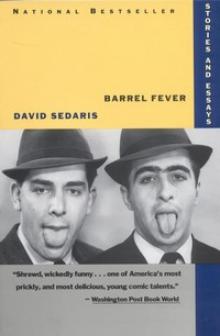 Barrel Fever and Other Stories
Barrel Fever and Other Stories